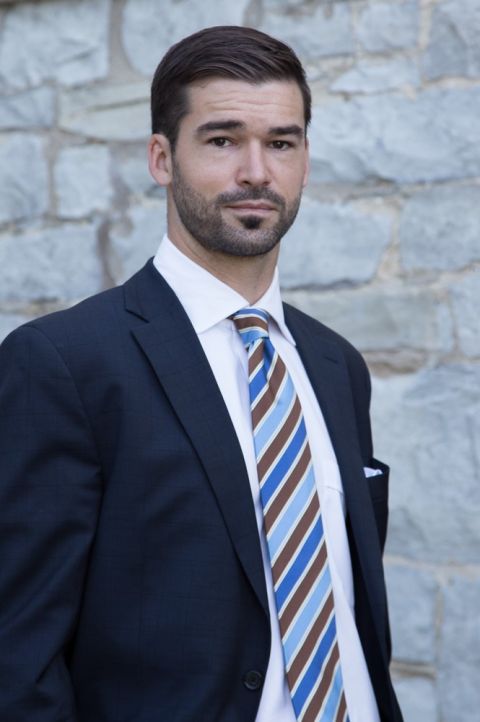
The door to where law can be practised is wide open like the practice of law itself. At Queen’s Law, the Career Development Office (CDO) equips students with the tools to accomplish what they want to achieve and where they want to achieve it, whether it’s in a large urban centre or in smaller regions and municipalities. Warren WhiteKnight, Law’13, took full advantage of the CDO’s services and resources throughout his legal studies, and found that pursuing a small-market practice was the right path for him.
When Vermont-native WhiteKnight accepted his offer to the Queen’s JD program, he had never been to Kingston before. Shortly after settling in to his new home, he “fell in love” with the region. Now he has a thriving practice in the “Limestone City,” focusing on injury law and medical malpractice. He’s as an associate lawyer with Bergeron Clifford LLP, a firm ranked by Canadian Lawyer magazine as one of Canada’s top 10 personal injury boutiques.
Practising in a smaller market that is central to Toronto, Montreal and Ottawa, WhiteKnight explains, has all the benefits of work-life balance that one would expect while still providing the excitement of “big city” legal opportunities.
“In Kingston, I am able to work on the same calibre of legal tasks that my Toronto and Ottawa colleagues do,” he says, noting how easy it is to travel by train to and from the bigger cities in order to attend courts throughout the Eastern Ontario region.
As for practising in the city of his alma mater, he finds it provides wonderful opportunities to network with fellow alumni, which in turn has been a boon to his practice. He enjoys developing and deepening his ties to Queen’s Law as a volunteer, a mentor and since 2016 as a sessional instructor of an Alternative Dispute Resolution class. “I am truly privileged to get to return the favour of good teaching and mentorship,” he says.
His subject area, which involves mediation and negotiation, fits with his professional expertise. “I try to give students a feel for running a ‘real’ file to help encourage them in thinking purposively about their legal practice, extracurriculars and life goals,” he says. “Being a lawyer is not a job – it’s a vocation and a privilege.”
When he was a student, he found that the Queen’s Law Clinics and the diverse range of extracurricular offerings gave his legal education greater scope and depth. “I was a volunteer with Pro Bono Students Canada in my first year, and acted as the Program Director at Queen’s in second year,” says WhiteKnight of his most memorable extra-curricular legal experience. “My involvement with PBSC gave me a perspective into how national legal organizations tailor that large scale to the local needs addressed by the individual programs.”
Rounding out his student experience, he sang in an a cappella barbershop group, All The Queen’s Men, and played pick-up soccer each day right next to the Faculty building. During his time at Queen’s, WhiteKnight found that the blend of highly structured and intensive study was nicely balanced with opportunities for unstructured fun and collegiality with students in law and other professional programs.
Reflecting on those student days, WhiteKnight credits the CDO for being indispensable in assisting his job search and networking process once he made it known that he wanted to stay in Kingston. “Career Development helped me with the important details of polishing my resume and cover letters, but also instructed me on how to get face-time with decision-makers at the firms I was interested in,” says Warren. “The staff helped with the smaller details of how to develop a system for tracking my applications and follow-ups and the bigger ones about small-market practice.”
For students interested in a small-market practice, WhiteKnight gives this advice: “Join the local law association as a student. Volunteer. Go to breakfasts and lunches of the local business association.” Connecting with local lawyers to gain insight about the market is an invaluable lesson, he stresses. “The most important thing in a small market is not telling people but rather showing people that you are serious about integrating into the community.”
By Quinn Brown